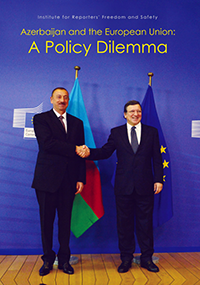
“Azerbaijan and the EU: A Policy Dilemma”
A new report by the Institute for Reporters Freedom and Safety (IRFS) calls for a tougher and more nuanced approach by the EU to Azerbaijan to address the country’s deteriorating human rights record

The report “Azerbaijan and the EU: A Policy Dilemma” addresses the role of the EU in promoting democracy in Azerbaijan, with a particular focus on the challenge of navigating between competing issues such as energy resources and human rights in an authoritarian context.
The report, published with support from International Media Support (IMS) is presented to parliamentarians from across Europe at a side event during the Europe Parliamentary Assembly (PACE) in Brussels on 24 September. With the side event and report, IMS and a number of local and international human rights organisations aim to raise debate and awareness around ongoing attacks on Freedom of Expression, association and assembly in the country.
Over the past 10 years, Azerbaijan has been developing an increasingly close relationship with the European Union, with a particular focus on energy cooperation. As stated on the website of the EU Delegation to Azerbaijan, the EU is seeking “an increasingly close relationship with Azerbaijan, going beyond cooperation, toward gradual economic integration and a deepening of political cooperation.”
In its democracy-promotion strategy for Azerbaijan, the EU acted more as a “soft power” with a strategy based around dialogue, cooperation and education. Today, a tougher and more nuanced approach is needed for the EU both to improve its political influence in Azerbaijan, and to address the country’s deteriorating human rights record. The report examines the status of implementation of EU commitments as laid out in the Partnership and Co-operation Agreement (PCA), and the ENP action plan. This, in turn, provides insight into how the EU could play a greater role in promoting democratic practices and human rights in Azerbaijan.
Read the report here or click here to learn more about IMS’ work in Azerbaijan.




